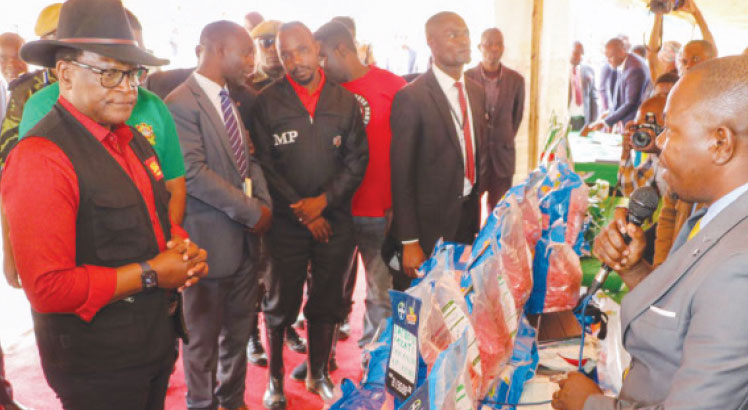Chakwera launches2023 AIP in Kasungu
President Lazarus Chakwera yesterday launched the 2023/24 growing season’s Affordable Inputs Programme (AIP) with a pledge that his administration will not abandon the programme.
The launch, which took place at Kavidebwere Primary School in Traditional Authority (T/A) Kaluluma in Kasungu, came a day after the Ministry of Agriculture started distributing AIP fertiliser to beneficiaries in some parts of the country.
Reiterating his administration’s commitment to the programme, Chakwera said there are still many farming families who are in need of farm inputs to ensure food security.
“Those people who are calling for the end of AIP are well off individuals, who can afford to pay for the farm inputs for their food production,” he said.

The President also said government is moving to revitalise agricultural production in the country by, among others, motivating farmers to move into mechanised farming.
During the ceremony, Chakwera also promoted T/As traditional authorities (T/As) Kaluluma and Simlemba to senior chiefs, and Sub-T/A Kalikhokha to T/A.
Speaking earlier, Minister of Agriculture Sam Kawale said all loopholes which rocked the programme last year have been sealed.
He said 73 percent of fertiliser for the programme is available, while the rest is on the way and will be arriving soon.
The minister added that 55 transporters have been authorised to provide as many trucks as possible to ensure that the farm inputs are distributed in time.
This farming season, government allocated K109.8 billion towards the AIP, of which K102 billion is earmarked for fertiliser purchases, K6.5 billion for seed, K585 million for goats and K67 million for operations.
The beneficiaries will pay K15 000 to redeem either a 50 kilogramme (kg) bag of Urea or NPK fertilisers. For those receiving a she-goat, they will also pay K15 000.
On seed, government will contribute K3 500 for a 5kg pack while the farmer will pay the difference.
Prior to launching the programme, Chakwera witnessed the first harvest of wheat at Mpale Wheat Farm, a mega farm run by Pyxus Agriculture in Dowa.
He described the event as the genesis of wheat mega farming in the country.
In his remarks, plant scientist Dr Laurent Pungulani said the wheat that has been developed can grow in all ecological zones of the country and can withstand Malawi’s hot temperatures.
Wheat is normally grown in cold areas and Malawi spends about $40 million (about K44 billion) annually to import it from other countries.





